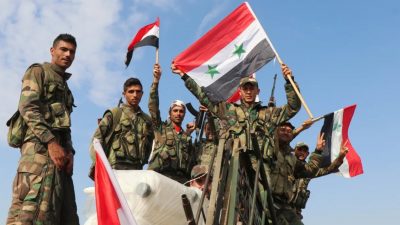US Sanctions Against Syria Fuelling Extremism and Radicalization

All Global Research articles can be read in 51 languages by activating the “Translate Website” drop down menu on the top banner of our home page (Desktop version).
Visit and follow us on Instagram at @crg_globalresearch.
***
The Syrian Army has launched an offensive against the city of Dara’a in the south of the country. President Bashar al-Assad announced in February 2016 his intentions to liberate “every inch” of Syria, but is now facing a resurgence of terrorist acts – even in liberated cities. This situation is even more aggravated by U.S. economic sanctions.
It is remembered that Dara’a, considered the cradle of the rebellion against the Syrian government in 2011, was liberated by Syrian and Russian forces in 2018. Since then, rebel and jihadist groups have reformed and collected a large arsenal.
As a result, Damascus has been besieging the small city of 40,000 inhabitants for more than a month. However, the situation is more complicated since Dara’a is located on the Jordanian border, the main point for trafficking arms, drugs and combatants. This flow of contraband makes government efforts to pacify the area all the more difficult.
To show their opposition to Damascus, many of the inhabitants of Dara’a refused to participate in the presidential election on May 26, a demonstration that they do not recognize the re-election of Assad for a fourth term. Moreover, despite the city’s liberation in 2018, many residents manifest their hostility through violence and chronic instability. Between armed clashes, kidnappings, thefts and riots, Damascus is struggling to restore order in the area.
Homs, Aleppo and Palmyra were liberated in 2014 and 2016 respectively. At the cost of bitter fighting, Syrian troops and their allies methodically liberated the cities, effectively annihilating the jihadists. However, liberation does not mean security and stability. Terrorists no longer act openly and rather carry out car bombings on the outskirts of cities, a way of showing that they can still do harm without having to capture territory.
The jihadist aim is no longer seizure of a territory but rather is to maintain a threat that weighs on people’s daily lives. Without the presence of the Syrian Army and its allies, anarchy would return to the country as the main backers of the jihadist groups, primarily Turkey and the U.S., have unabatedly continued to support them.
According to Lebanese site Daraj, ISIS stepped up their operations in 2020 and killed more than 1,300 Syrian soldiers, two Russian personnel and 145 pro-Iran militiamen. This renewed ISIS threat is not about to fade, especially given the worsening economic situation in Syria caused by U.S.-led sanctions.
The Syrian pound has lost value: from 50 per dollar before the conflict to 2,300 today. Gasoline is rationed and residents struggle to heat themselves in winter. A lot of these issues for ordinary Syrians can be easily alleviated, but Washington categorically refuses to allow Damascus to benefit from the oilfields that Kurdish forces in eastern Syria control. The Biden Administration maintains 900 troops east of the Euphrates River to support Kurdish forces. These Kurdish proxies are unofficially preventing Syria from exploiting its own oil and agriculturally rich land.
Washington has also implemented a series of sanctions aimed at suffocating the Syrian economy. The Caesar Syria Civilian Protection Act, which came into force in June 2020, prevents the country from trading with the outside world, depriving it of imports. 411 Syrian people and 111 Syrian companies, banks and state bodies are affected by this Act.
Making the economic situation even more catastrophic for the Syrian people is the added crisis in neighbouring Lebanon. The two countries effectively have an intertwined financial system. According to Assad, between $20-42 billion belonging to Syria has likely disappeared due to the collapse of the Lebanese banking sector.
As the economic situation is untenable, people are more exposed to radicalism, especially as bread and onions is now the staple daily diet for many Syrians today. The radicalization of entire sections of Syrian civil society is linked with the economic situation, a situation that Turkish President Recep Tayyip Erdoğan has taken advantage of to recruit a proxy army of Syrians to not only fight in northern Syria, but even in the Caucasus and North Africa.
Although the Syrian Army has mostly won the armed conflict, under such difficult economic circumstances, it is expected that radicalism will be a permeating problem in the country. The West does not allow Syria to economically recover and are thus once again fuelling extremism in the country.
*
Note to readers: Please click the share buttons above or below. Follow us on Instagram, @crg_globalresearch. Forward this article to your email lists. Crosspost on your blog site, internet forums. etc.
Paul Antonopoulos is an independent geopolitical analyst.
Featured image is from Mideast Discourse
Order Mark Taliano’s Book “Voices from Syria” directly from Global Research.
Mark Taliano combines years of research with on-the-ground observations to present an informed and well-documented analysis that refutes the mainstream media narratives on Syria.
 Voices from Syria
Voices from Syria
ISBN: 978-0-9879389-1-6
Author: Mark Taliano
Year: 2017
Pages: 128 (Expanded edition: 1 new chapter)
List Price: $17.95
Special Price: $9.95

